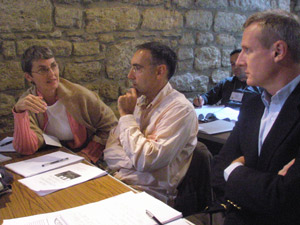


















Translate this page from English...
*Machine translated pages not guaranteed for accuracy.
Click Here for our professional translations.
How To Teach Students To Master Content
By Developing A Questioning Mind
 The quality of our lives is determined by the quality of our thinking. The quality of our thinking, in turn, is determined by the quality of our questions, for questions are the engine, the driving force behind thinking. Without questions, we have nothing to think about. Without essential questions, we often fail to focus our thinking on the significant and substantive.
The quality of our lives is determined by the quality of our thinking. The quality of our thinking, in turn, is determined by the quality of our questions, for questions are the engine, the driving force behind thinking. Without questions, we have nothing to think about. Without essential questions, we often fail to focus our thinking on the significant and substantive.
 Essential questions fall into a range of categories. Some essential questions are principally analytic, some principally evaluative. Some apply predominantly to academic subjects, others to our innermost thoughts, feelings, and desires.
Essential questions fall into a range of categories. Some essential questions are principally analytic, some principally evaluative. Some apply predominantly to academic subjects, others to our innermost thoughts, feelings, and desires. Every field stays alive only to the extent that fresh questions are generated and taken seriously as the driving force in thinking. When a field of study is no longer pursuing significant answers to essential questions, it dies as a field. To think through or rethink anything, one must ask the questions necessary to thinking through the logic of that thing, clearly and precisely.
Every field stays alive only to the extent that fresh questions are generated and taken seriously as the driving force in thinking. When a field of study is no longer pursuing significant answers to essential questions, it dies as a field. To think through or rethink anything, one must ask the questions necessary to thinking through the logic of that thing, clearly and precisely.
Please do not pass this message by.
CRITICAL THINKING IS AT RISK.
Here are some of the big reasons why:
As you see, increasingly powerful trends against the teaching, learning, and practice of critical thinking entail extraordinary challenges to our mission. To continue our work, we must now rely upon your financial support. If critical thinking matters to you, please click here to contribute what you can today.
WE NEED YOUR HELP TO CONTINUE OUR WORK.
Thank you for your support of ethical critical thinking.